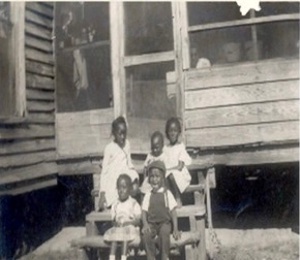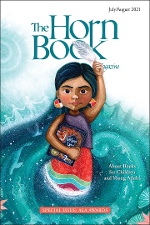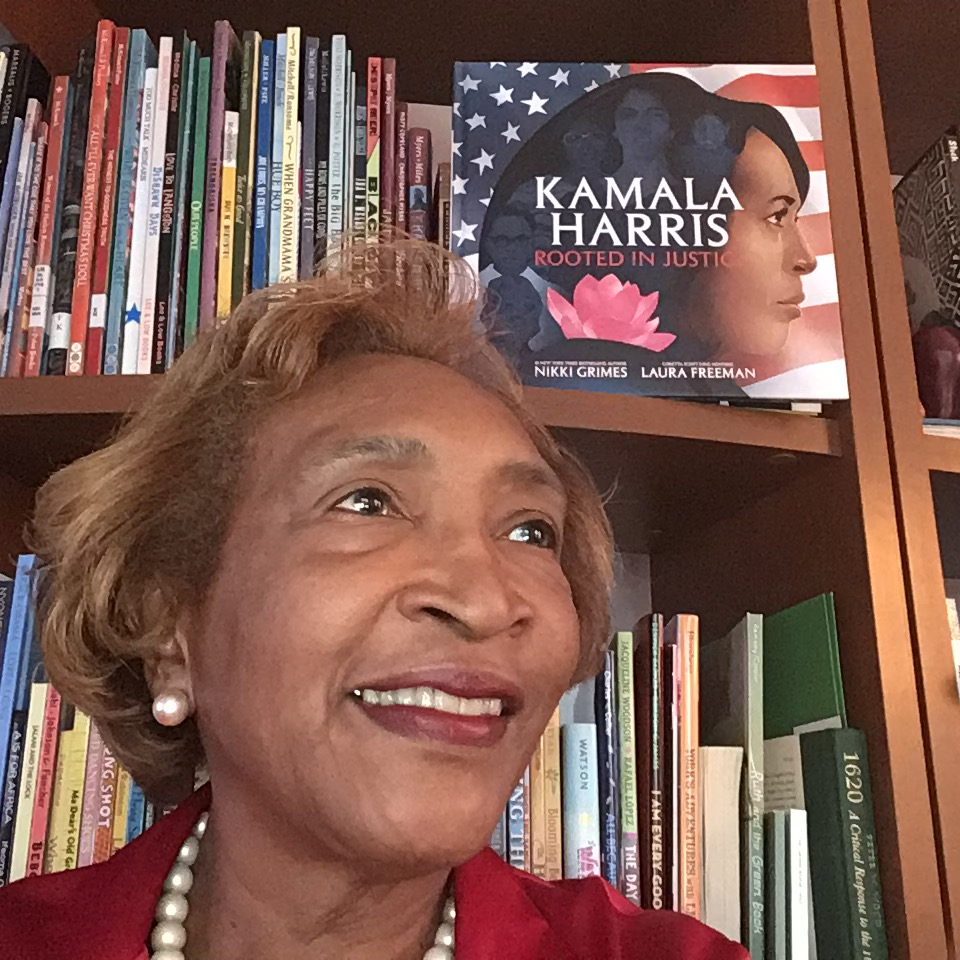2021 CSK–Virginia Hamilton Award Acceptance by Dorothy L. Guthrie
I am so honored to have my work recognized with this award. I want to thank chair Ida Thompson and the CSK–Virginia Hamilton Lifetime Achievement Award Jury for this honor.
Virginia Hamilton has always been one of my favorite authors. I can still remember how I felt when I read her novel The House of Dies Drear. Dies Drear showed compassion by accommodating fugitive slaves who embarked on the Underground Railroad. And, today, I can associate the book with people in my life who helped me reach my goals.
I am so honored to have my work recognized with this award. I want to thank chair Ida Thompson and the CSK–Virginia Hamilton Lifetime Achievement Award Jury for this honor.
Virginia Hamilton has always been one of my favorite authors. I can still remember how I felt when I read her novel The House of Dies Drear. Dies Drear showed compassion by accommodating fugitive slaves who embarked on the Underground Railroad. And, today, I can associate the book with people in my life who helped me reach my goals.
I want to thank my husband and best friend, Bobby Guthrie, who encourages me to use my God-given talents, prays for me, and has supported me since September 20, 1970.
I make the following statement from the innermost part of my heart: The Coretta Scott King Book Awards completely changed my life. While growing up in the little town of Clover, South Carolina, the oldest of six children born to a sharecropper and his wife, I did not know much about the world. I only knew how to drop cotton seeds, weed between the cotton stalks and rows, and pull out the white, fluffy cotton from the bolls.

Young Dorothy and siblings in Clover, South Carolina.
I realized at an early age that the cotton crops were my parents’ only income and that I needed to help them be successful. So, when I was not in the fields, I was attending to my siblings — dreaming that I was in school. It was great to know that when Farmer Littlejohn (my father) carried a bale of cotton to the cotton gin, it meant we would get a loaf of store-bought bread and a pound of bologna, which was indeed a special treat in our house.
Thus, I began my life journey. And one thing I knew was that I wanted to carry more on my shoulders than a cotton sack made from burlap.
I graduated from Roosevelt High School in 1964 and left my name etched on my senior class’s “superlatives” list. My class voted me as “Most Unpredictable.” While I did not like this label, it did give me something to think about.
I attended South Carolina State College (now University) in the fall of that year. We did not own a car, so my neighbor drove me to Orangeburg, South Carolina. Wow! What a big world it seemed to me when I saw such a large territory dedicated to teaching and learning. I will never forget Mrs. Rossie Caldwell, my freshman advisor and an associate professor in the School of Library Science. It was she who motivated me to become a librarian.
I registered to take her children’s literature course, and one day she introduced us to Madeline Robinson Stratton’s Negroes Who Helped Build America. I fell in love with that book and checked it out the same day, then renewed it several times to prevent it from becoming overdue. For the first time in my life, words seemed to jump off the pages — right into my heart, soothing my soul with comfort. That was when I first learned how important it was to study, learn, and know African American history and culture. I fell in love with my history because of that book.
But wait! Where were this book and others like it when I had needed them in school? Why hadn’t I found those books in my library? While I learned how to read from books about Dick, Jane, Sally, Tim, Spot, and Puff, I could not relate to them. There were times when I found a book that I wanted to read, but often I could not finish it because of missing pages, pages filled with crayon or pencil marks, or pages stuck together with bubble gum. There was a divide in the literary world, and I did not like it!
***
In 1974, I became the outreach children’s librarian at the Gaston-Lincoln Regional Library in North Carolina. I wanted to make a difference. I wanted to give the excited little readers approaching the bookmobile books that served as mirrors, so they could see their reflections, relate to the characters, and feel represented. This became a challenge due to the small number of books published representing the Black experience.

Dorothy in 1983.
When I became director of student support services for Gaston County Schools, my first major rollout was reforming school libraries. I asked librarians to assess their collections, to look at collection age and the books-per student-ratio based on ethnicity. Libraries that failed to hit the criteria I’d established became targets for reform.
One day, in a local high school classroom, I observed a group of students, many of them students of color, who seemed bored and appeared to be lagging behind academically. I believed that I could change their mindset — and do it through the Coretta Scott King Book Awards. I approached the school superintendent and the curriculum coordinator for Gaston County Schools with my concerns. I was asked, “What is worth knowing? What measurable competencies should students be expected to achieve? What are the benefits of presenting these award-winning books at the high school level?” I had the answers — to become familiar with an array of diverse and culture-related literature in print and non-print; to build character.
With permission to teach the Coretta Scott King Book Awards curriculum for nine weeks, I was ready to motivate those young people just as Rossie Caldwell had motivated me. However, on day one of my visit, students did not receive my presentation as I had when Rossie presented her lesson plan to me. In fact, on the first day I walked into that ninth-grade classroom at Ashbrook High School, if my love of promoting books had not been so great and the students’ need for knowing books reflective of their culture and heritage not so critical, I would have turned around and returned to my office. Nonetheless, I began. I pulled out a basketball and begin to dribble. Then I introduced the book Slam! by Walter Dean Myers. Slowly, heads began to leave the desks. Next, I pulled out my needle, thread, and quilt squares and then shared The Patchwork Quilt by Valerie Flournoy, illustrated by Jerry Pinkney — announcing to students that we are like quilt squares. By then there were just a few heads left on the desks. The last “hook” pulled from the bag was an old-fashioned bonnet, which I placed on my head before reciting the iconic Sojourner Truth speech “Ain’t I a Woman?” and sharing Sojourner Truth by Patricia C. McKissack and Fredrick McKissack. After that, all heads were in an upright position. The “hooks” had worked! I had their attention! Those were the best nine weeks and produced the best project-based outcome.

A museum display case of CSK Award books and related materials.
From that experience, I had data to support my beliefs, reasons, and passion for sharing the CSK Awards and African American history and culture. I looked for every opportunity to replace the old sack that once swung from my shoulders filled with cotton with a “literacy poke” filled with stories and people of the African diaspora. I did not want another child to grow up without knowing about these books, their history, and their culture. Then, and now.
I recall the words once spoken by Dr. Nannie Helen Burroughs years ago to the director of the DuSable Museum of African American History in Chicago. Dr. Burroughs said, after she had the grand opportunity to meet Paul Robeson, “I felt so proud that I was of the same ethnicity as him.” This is how we want children of color to feel about their history and culture.
***
Realizing that educational standards were still deficient in covering African American history and culture, I wanted to find a way to make the history more comprehensive. I wanted to find a way to tell these stories. I wanted to find a way for people to see the world and learn more about the voices that rang out for freedom.
In 2017, I asked Dr. Benjamin Hinton, senior pastor of Gastonia’s Tabernacle Baptist Church, if I could create a mini-museum in the Family Life Center. His reply was: “Make it happen.”
I spoke with the late James “Jim” Biggers, a renowned artist in Gaston County, about the plan. He agreed to bring his visual exhibit of prominent people in the county, which he displayed for special events. We accomplished our goal. Nearly four hundred people passed through the mini-museum that day.
Even that success could not satisfy my desire to offer a museum for a longer period. So the process began with Anthony Powell, human resources division manager of Firestone Fibers & Textiles Company, who referred me to Jaggy Anand, a retired Firestone president. Jaggy led me to Bob Clay, partner at Coldwell Banker Commercial, who led me to Joseph Lenihan, managing member of Loray Mill, who granted permission for me to set up a museum in that historic site. With such support, I became more determined to create a permanent museum in Loray Mill. I met with Joe and Bob one rainy afternoon in November and signed a three-year contract to open an African American Museum in July 2018. With only my and Bobby’s funds, sacrificing our summer vacation, I agreed to pay fourteen hundred dollars a month for three years.



Setting up the museum exhibit at Loray Mill.
On February 16, 2019, the museum opened. The grand opening brought together elected officials, community leaders, and citizens of every ethnicity representative of the culture of Gaston County. From February 16, 2019, to March 16, 2020 (when the museum closed due to the pandemic), over four thousand visitors visited the museum. The museum is filled with resources that illuminate African Americans, their lives, achievements, and accomplishments. The Coretta Scott King Book Awards are very much a part of our history, tours, and programming.

With former school board chairman Brent Moore and husband Bobby Guthrie.
***
I have been strengthened and motivated by my experience as a librarian, an author (Integrating African American Literature in the Library and Classroom, Libraries Unlimited, 2011), and founder of a museum. Thank you once again to the Coretta Scott King–Virginia Hamilton Award for Lifetime Achievement Jury, for shaking me, waking me, and informing me that the dream is a reality.
 Dorothy L. Guthrie 2019 Coretta Scott King–Virginia Hamilton Practitioner Award for Lifetime Achievement. Her acceptance speech was delivered at the virtual American Library Association Book Award Celebration, on June 27, 2021. From the July/August 2021 issue of The Horn Book Magazine: Special Issue: ALA Awards. For more speeches, profiles, and articles, click the tag ALA 2021.
Dorothy L. Guthrie 2019 Coretta Scott King–Virginia Hamilton Practitioner Award for Lifetime Achievement. Her acceptance speech was delivered at the virtual American Library Association Book Award Celebration, on June 27, 2021. From the July/August 2021 issue of The Horn Book Magazine: Special Issue: ALA Awards. For more speeches, profiles, and articles, click the tag ALA 2021.
Single copies of this special issue are available for $15.00 including postage and may be ordered from:
Kristy South
Administrative Coordinator, The Horn Book
Phone 888-282-5852 | Fax 614-733-7269
ksouth@juniorlibraryguild.com

RELATED
ALREADY A SUBSCRIBER? LOG IN
We are currently offering this content for free. Sign up now to activate your personal profile, where you can save articles for future viewing.






Add Comment :-
Be the first reader to comment.
Comment Policy:
Comment should not be empty !!!